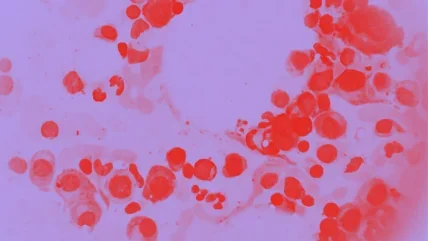
Janssen-Cilag International, a Johnson & Johnson (J&J) company, has announced new positive data on Darzalex (daratumumab) subcutaneous (SC)-based regimens from the Phase 3 CEPHEUS and AURIGA trials.
According to the results, these regimens improved minimal residual disease (MRD) negativity rates and progression-free survival (PFS) in patients with newly diagnosed multiple myeloma (NDMM). This improvement was observed regardless of transplant status.
The findings were part of an expanded MRD analysis from the CEPHEUS study and a post hoc analysis from the AURIGA study.
Darzalex is the brand name for daratumumab SC in the European Union, while in the US, it is called Darzalex Faspro.
Data from the expanded MRD analysis of the Phase 3 CEPHEUS study showed that adding daratumumab SC to bortezomib, lenalidomide, and dexamethasone (D-VRd) significantly improved overall and sustained MRD negativity rates. This improvement was seen at both 10-5 and 10-6 sensitivity thresholds in patients who achieve a complete response or better.
J&J stated that this combination also enhances PFS compared to VRd alone.
In a post hoc analysis of the Phase 3 AURIGA study, the investigational maintenance regimen of daratumumab plus lenalidomide (D-R) showed consistently improved MRD-negative conversion rates after 12 months.
These results were particularly notable in anti-CD38 naïve, MRD-positive patients post-autologous stem cell transplant (ASCT).
For patients aged over 65 years, D-R maintenance therapy had higher MRD-negative rates compared to lenalidomide alone. Additionally, D-R showed superior MRD-negative conversion rates in Black patients and white patients alike.
The final analysis of the Phase 3 ANDROMEDA study was also presented.
The study showed that adding daratumumab SC to bortezomib, cyclophosphamide, and dexamethasone (D-VCd) significantly improved survival and reduced the risk of organ deterioration. It also provided deeper, faster haematologic responses in newly diagnosed light chain (AL) amyloidosis patients.
In a similar development, the drugmaker announced Phase 3 AQUILA study data. The results indicated that daratumumab SC significantly delayed progression from high-risk smouldering multiple myeloma (SMM) to active multiple myeloma (MM) and extended overall survival compared to active monitoring.
The regimen showed a 51% reduction in risk of disease progression.
Furthermore, J&J announced new frontline data from the MajesTEC-5 and MajesTEC-4 studies, highlighting Tecvayli (teclistamab-cqyv) as a promising treatment for NDMM with strong efficacy and a tolerable safety profile.






